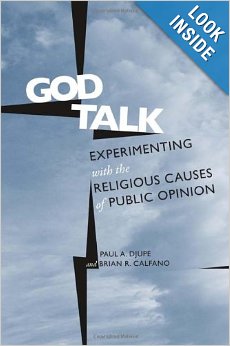God Talk: Experimenting with the Religious Causes of Public Opinion, a volume examining whether and how religion influences public opinion, politics and candidates, is the just-released book co-authored by PRRI affiliated scholar Paul Djupe of Denison University and Missouri State University’s Brian Calfano. Read on for a look at their findings, or click here to purchase the book.
In our new book God Talk, we use experimental methodology to understand how elites might use religion to influence the public as well as how the public reacts to the use of politics by religious elites. One strategy that we discuss is the set of “closed-circuit”
cues that GOP politicians employ when trying to both shore up constituencies within the traditional party base (i.e., evangelical Christians) while picking up enough moderates to capture the median voter. Phrases like “wonder-working power” (from the hymn “There is Power in the Blood”) and “one stray lamb” (from the parable of the lost sheep in Ezekiel) would signal to evangelicals that the speaker (George W. Bush, in this case) was one of them without having to stake out extreme positions on culture wars issues. Our experimental evidence suggests that covert God Talk is effective, though with some interesting nuances.
We also investigate the classic notion of religion’s role to instill a particular worldview. As part of this worldview, one key decision religious elites make is how much to emphasize inclusion and an embrace of the world versus how much to shut it out and remain exclusive. Simple exposure to inclusive messages serves to expand perceptions of who “their people” are, whereas exclusive values narrow that view. As a consequence, our evidence suggests that more exclusive messages undermine support for group-based policies like immigration and foreign interventions by the United States; they even drive people to be more intolerant.
We can see these same dynamics playing out in the Republican Party, where a non-trivial number of Republican elites are rhetorically strident in competition for the base. And following clear presidential election losses, Republicans have reevaluated their degree of inclusion, searching for issues and language that would expand the base. These two dynamics are clearly linked. As our God Talk work helped to establish, strident, overt cues are not ways to build broader bases of support, whether a congregation or electorate. Hence, it seems that when one speaks for God, doing so softly is probably a good idea.
This research addresses a broader debate among political observers concerning how influential elites are in driving partisan polarization. In religion and politics research, we actually find little evidence that elites (like clergy) are influential. There is widespread misperception in the pews about the political issues clergy address and studies find little relationship between clergy and congregant attitudes. There is even some evidence that the more clergy talk about politics, the more defensive their congregants are. Moreover, research on clergy political behavior strongly suggests they take cues from their congregations about what to talk about and how to say it. Do religious elites have influence, and if so, how do they influence their audiences? While direct engagement may be effective in mobilizing existing supporters for action, our work in God Talk suggests that the way to increase support is to bypass the defenses people erect to defend their political opinions. From our evidence, the best way to shape political views is to avoid politics altogether and instead build worldviews with natural political implications.





